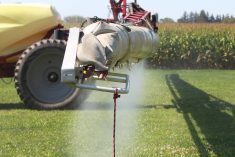Late last week the U.S. Environmental Protection Agency published a report saying glyphosate does not cause cancer, but then quickly removed the document from a federal government website.
The EPA’s Cancer Assessment Review Committee released the report April 29. On Monday, Monsanto issued a press release praising the agency’s findings on glyphosate, the active ingredient in Roundup herbicide.
“No pesticide regulator in the world considers glyphosate to be a carcinogen, and this conclusion by the U.S. EPA once again reinforces this important fact,” said Hugh Grant, chair and chief executive officer of Monsanto, which manufactures Roundup. “Glyphosate has a 40-year history of safe and effective use…. This rigorous assessment of the data by EPA builds on the sound conclusions of both the European and Canadian regulatory authorities and once again makes it clear that glyphosate does not cause cancer.”
Read Also

Europe holds promise for Canadian lentils
Pulse Canada is trying to help boost lentil consumption in Europe, which is already the fourth largest market.
Last year the International Agency for Research on Cancer, a division within the World Health Organization, said glyphosate probably causes cancer.
Monsanto said the IARC report was flawed and “generated unwarranted concern and confusion about this important agricultural tool.”
The rationale behind the EPA’s decision is no longer publicly available because the agency took the report offline.
The EPA told Reuters that the documents were published inadvertently and the complete assessment won’t be released until later this year.
Health Canada published its safety review of glyphosate last April. It concluded the herbicide doesn’t pose a risk to human health.
“Toxicology studies in laboratory animals describe potential health effects from varying levels of exposure to a chemical and identify the dose at which no effects are observed,” Health Canada said. “The health effects noted in animals occur at doses more than 100 times higher (and often much higher) than levels to which humans are normally exposed when glyphosate products are used according to label directions.”
Contact robert.arnason@producer.com
















